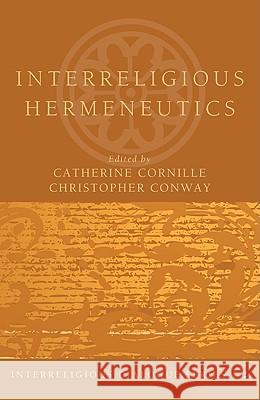Interreligious Hermeneutics » książka
Interreligious Hermeneutics
ISBN-13: 9781608996698 / Angielski / Miękka / 2010 / 254 str.
Interreligious Hermeneutics
ISBN-13: 9781608996698 / Angielski / Miękka / 2010 / 254 str.
(netto: 122,06 VAT: 5%)
Najniższa cena z 30 dni: 127,45
ok. 16-18 dni roboczych.
Darmowa dostawa!
Description: Catherine Cornille, Boston College David Tracy, University of Chicago Divinity School Werner Jeanrond, University of Glasgow Marianne Moyaert, University of Leuven John Maraldo, University of North Florida Reza Shah-Kazemi, Institute of Ismaili Studies Malcolm David Eckel, Boston University Joseph S. O'Leary, Sophia University John P. Keenan, Middlebury College Hendrik Vroom, VU University Amsterdam Laurie Patton, Emory University Endorsements: ""The implications of understanding between the religions are as unclear as it is clear that such understanding is badly needed. What is intriguing about this volume is not only that it enters this still widely uncharted territory but that many of its contributions explore which light the continental tradition of hermeneutic philosophy might shed on this field."" --Perry Schmidt-Leukel University of Muenster, Germany ""This is a book packed with expertise and insight. In light of the complexities of interreligious dialogue, the authors use the creativity of hermeneutical understanding to walk a necessary tight-rope: discovering those meanings that cut across religious traditions while respecting the particularity and non-negotiable otherness that exists in every religious tradition. The savvy editors have crafted a substantive volume that gives hope for true dialogue in our world of almost bewildering religious diversity."" --Anthony J. Godzieba Villanova University About the Contributor(s): Catherine Cornille is Associate Professor of Comparative Theology at Boston College. She is the author of The Im-Possibility of Interreligious Dialogue (2008) and editor of Many Mansions? Multiple Religious Belonging and Christian Identity (2002) and Song Divine: Christian Commentaries on the Bhagavad Gita (2006). She is managing editor of the series Christian Commentaries on Non-Christian Sacred Texts. Christopher Conway is a doctoral candidate in Comparative Theology at Boston College, working in the area of the Hindu-Christian dialogue."
Description:Catherine Cornille, Boston CollegeDavid Tracy, University of Chicago Divinity SchoolWerner Jeanrond, University of GlasgowMarianne Moyaert, University of LeuvenJohn Maraldo, University of North FloridaReza Shah-Kazemi, Institute of Ismaili StudiesMalcolm David Eckel, Boston UniversityJoseph S. OLeary, Sophia UniversityJohn P. Keenan, Middlebury CollegeHendrik Vroom, VU University AmsterdamLaurie Patton, Emory UniversityEndorsements:""The implications of understanding between the religions are as unclear as it is clear that such understanding is badly needed. What is intriguing about this volume is not only that it enters this still widely uncharted territory but that many of its contributions explore which light the continental tradition of hermeneutic philosophy might shed on this field.""--Perry Schmidt-LeukelUniversity of Muenster, Germany""This is a book packed with expertise and insight. In light of the complexities of interreligious dialogue, the authors use the creativity of hermeneutical understanding to walk a necessary tight-rope: discovering those meanings that cut across religious traditions while respecting the particularity and non-negotiable otherness that exists in every religious tradition. The savvy editors have crafted a substantive volume that gives hope for true dialogue in our world of almost bewildering religious diversity.""--Anthony J. GodziebaVillanova UniversityAbout the Contributor(s):Catherine Cornille is Associate Professor of Comparative Theology at Boston College. She is the author of The Im-Possibility of Interreligious Dialogue (2008) and editor of Many Mansions? Multiple Religious Belonging and Christian Identity (2002) and Song Divine: Christian Commentaries on the Bhagavad Gita (2006). She is managing editor of the series Christian Commentaries on Non-Christian Sacred Texts.Christopher Conway is a doctoral candidate in Comparative Theology at Boston College, working in the area of the Hindu-Christian dialogue.











